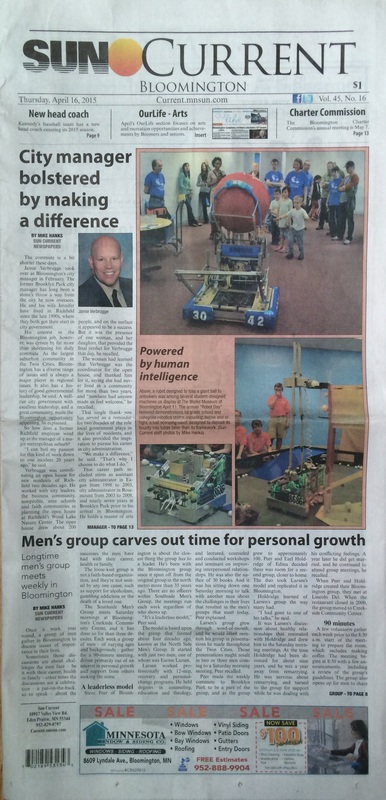| When COVID surfaced, we quickly instituted a ZOOM telecommunication meeting that continues as an option to our traditional face-to-face experience. If you want to join us either was, we'd encourage you to reach out via our contact page. |
|
The topic at last Saturday's meeting was
"What is the soap opera in your life, now?"
Once a week, year round, a group of men gather in Bloomington to discuss issues of importance in their lives.
In 2014, neuroscience leapt out of the research laboratories and became an integral part of how we think (literally) about business. Here are the discoveries and insights that have changed the workplace over the past year:
1. Your brain uses words to interpret events. Therefore, the words that you attach to emotions determine how you experience those emotions. If you use intense words (hate, stress, dread, etc.) describe how you feel in challenging situations, you intensify the fight/flight response, which is ineffective in business. Relabeling your emotions with bland or positive words (dislike, excited, curious, etc.) makes a fight/flight response less likely, making you calmer in a pinch. 2. Once again, because your brain uses words to interpret events, fuzzy words create fuzzy thinking and vice-versa. Training yourself to use shorter, less ambiguous words, enables your brain to more accurately characterize situations and thus devise effective, creative responses. Three simple exercises can help you do this: 1) avoiding buzzwords and biz-blab, 2) simplifying your business writing, and 3) practicing the "one syllable" game. 3. Neuroscientists and psychologists have long studied how the human brain reacts to visual, audio and tactile experiences. Thevcorrect combination of those experiences increasess the amount of information that an audience absorbs and retains. Eight simple changes to your presentation (like an easily understood storyline) can vastly improve your ability to influence others. 4. The human brain contains mirror neurons that tend to make people imitate the behavior and thought processes of others. Great leaders find ways to inspire their followers to have certainty that the leader's strategies and tactics will work. Four simple changes to your management style can therefore make people more willing to follow your leadership. 5. It's intuitive that people are more willing to follow the lead of an optimist who seeks the positive rather than a pessimist who fears the negative. Neuroscience can now explain why this is true: optimists have greater control of their thought processes and are less likely to panic. Five basic mental habits help managers and leaders encourage and create the right attitude for their own success and the success of the teams they lead. As I redid the site, it seemed to be missing a signature image, or logo, so I commissioned this one and am eager to her your feedback:
Question (12/13/2014): How stable is your relationship?
Question (12/6/2014): How do I figure out how to turn anxiety around and not let it turn to anger? Question (11/29/2014): Are you doing things to please yourself or others? Question (11/22/2014): What makes you sweat? Question (11/15/2014): Are you the man you really think you wanted to be as a kid? The purpose of this blog is not to archive talks. I reference this particular talk on this particular Saturday as two documents were mentioned: The Five Wishes directive, and the POLST document, both end-of-life documents. The Fives Wishes is a document is purchased from http://www.agingwithdignity.org (the file below is a sample). It is a lengthier document that guides the user through a broad range of aspects including family, medical care, and burial. The POLST requires a doctor guidance to complete (and sign), but the result is a single-sided, single-page document meant for professions to instantly inform them of the medical care options you choose.
|
AuthorComments, news, and announcements relating to our men's group goals and activities. Please, no last names. CategoriesArchives
March 2021
|
|||||||||||||||||






 RSS Feed
RSS Feed
